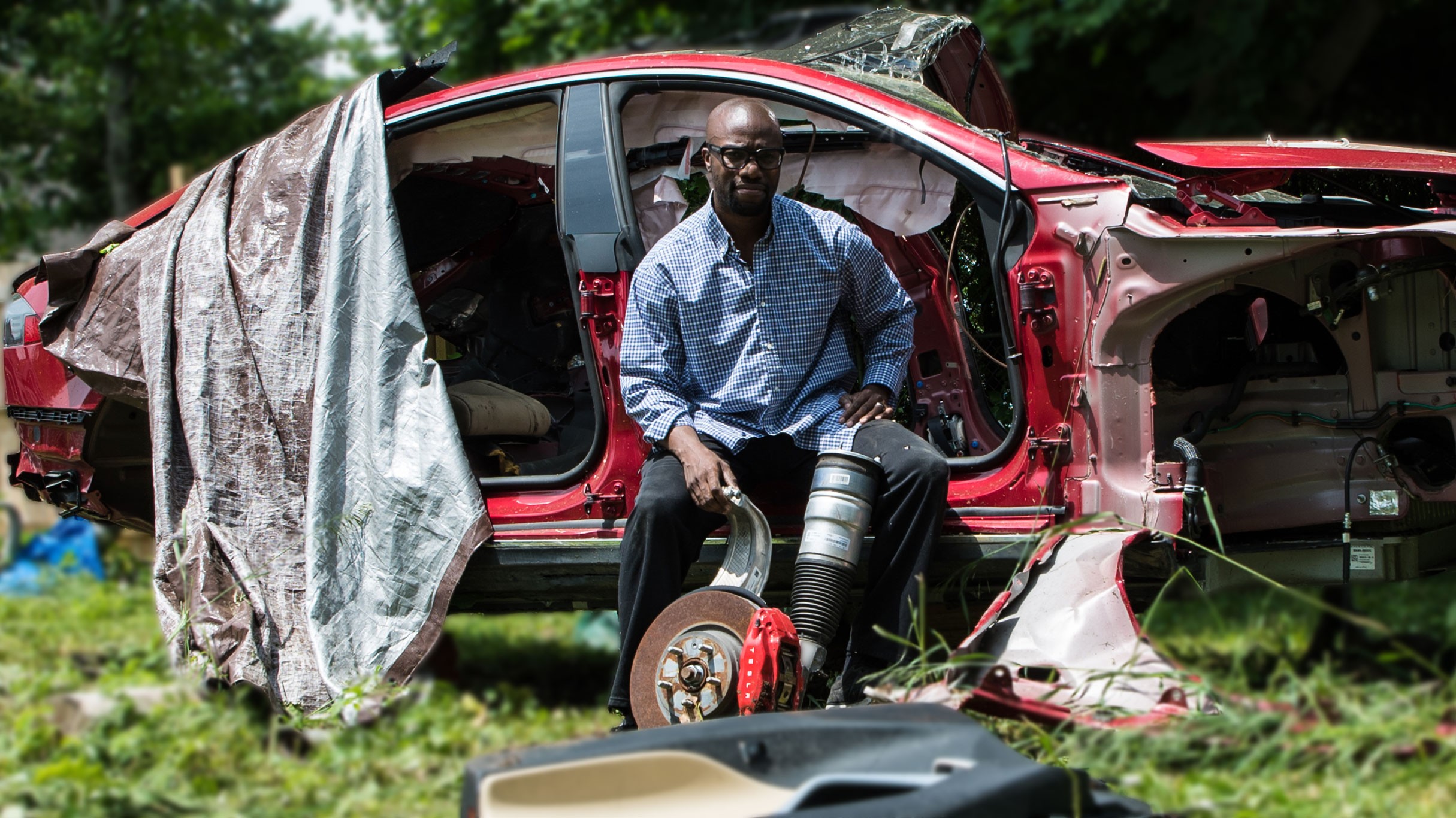You may have noticed that Motherboard has been in a low-power state the last week or so, as our staff rests up from what has been a particularly eventful 2018. We’ll be turning the lights back on January 2. But before we do, I wanted to take a minute to highlight some of the excellent work that the Motherboard team and our freelancers have put together this year.In the summer, we released The Most Unknown, Motherboard’s first foray into feature-length documentary filmmaking. The movie is a love letter to the scientific process that chases nine scientists around the world as they try to solve humanity and the universe’s most mysterious questions. The film had a successful international theatrical and festival run and is available on Netflix; exclusive online-only episodes are available on our YouTube. It is the work of Ian Cheney, Derek Mead, Thobey Campion, Xavier Aaronson, Erik Franco, and more than a hundred other folks who touched the film in some capacity.
Advertisement
We’ve been saying this for years, but “tech news” is really just “news” these days, which is evident from the number of major, national stories that Motherboard has broken or been in the mix on. For example: Samantha Cole’s series of stories about AI-generated face-swap porn, called “deepfakes,” has started a national conversation about consent, online harassment, revenge porn, and the fundamental nature of truth. Congress and the intelligence community continue to grapple with what to do about deepfakes; meanwhile, women continue to be targeted by them.Perhaps the year’s biggest story—the ways in which Facebook mishandles user data—was broken by Motherboard in January 2017 with “The Data That Turned the World Upside Down,” which introduced the world to a British firm called Cambridge Analytica. As that scandal became international news this year, Motherboard helped explain the underlying architecture of Facebook that allowed user data to be shared and, when Congress decided to focus on allegations of “bias” on the platform rather than data privacy, we began to publish a series of stories about how Facebook does content moderation, based on internal documents and sources gathered by reporter Joseph Cox. These stories showed how Facebook determines if an emoji is hate speech, shows the company’s post-Charlottesville reckoning with American neo-Nazis, and culminated in a 9,000-word investigative piece detailing the impossible task that Facebook faces trying to police the speech of 2 billion people around the world. Facebook is now reconsidering its stance on “white nationalism” and “white separatism” after a widespread civil rights backlash and national media attention stemming from Motherboard’s reporting.
Advertisement
Speaking of Facebook, our staff considered what Facebook would look like if the US government decided to nationalize it, we showed readers how to poison their Facebook data, and staff writer Daniel Oberhaus deleted his Facebook—then went a step further and decided to not use any services or products from Facebook, Google, Amazon, Apple, or Microsoft for a full month with the Motherboard Guide to Quitting the Big Five.We published Version 3.0 of The Motherboard Guide to Not Getting Hacked, introduced a new hacking-focused podcast called CYBER, and Joseph Cox and Lorenzo Franceschi-Bicchierai continued to be among the best hacking reporters in the world. Lorenzo’s series of stories about SIM hijacking alerted the world to alarming insecurities in two-factor authentication and among America’s wireless providers. He also wrote a definitive piece about the US government’s beef with Kaspersky, checked back in with Hacking Team’s mysterious new investor, learned how Phineas Fisher got away with hacking Hacking Team, and found some iPhone source code floating around online. He and Joseph continued to write stories about stalkerware—cheap spyware that is used by domestic abusers and happen to be run by sketchy companies who regularly get hacked. In the higher-end spyware market, we learned about Grayshift, a company that sells cheap iPhone-unlocking devices, and tracked which law enforcement agencies have acquired the technology (and learned how cops evade transparency requests about their use of the tool.) We also went inside an NSO Group iPhone malware demo and investigated Azimuth, a little-known Australian company that sells hacking tools to Five Eyes spying agencies.
Advertisement
I personally ended last year in Australia, embedded with iFixit as it once again sought to be the first team to tear down the new iPhone. We released a documentary about the process earlier this year as one of six new State of Repair episodes—I’m also partial to the episodes about farmers who are hacking their tractors to fight John Deere’s repair monopoly and one about Rich Benoit, a DIY Tesla repairman who singlehandedly rebuilds salvaged Teslas against the company’s wishes.It was an eventful, up-and-down year in the right to repair world, with 19 state-level bills proposed around the United States (none passed.) At the federal level, the situation was a bit brighter, with the FTC ruling once and for all that warranty-void-if-removed stickers are illegal (and demanding that six companies change their packaging after a Motherboard investigation into the practice.) The Librarian of Congress granted a broad exemption that legalizes repair on most electronic devices, but Apple continued its war on repair: The company has a built-in kill switch that will prevent third-party repair on new MacBook Pros, the Department of Homeland Security seized Apple repair parts from two prominent right-to-repair activists in the US, and Apple sued an independent repair tech in Norway—and lost. Besides quitting the Big Five, Daniel Oberhaus regularly explained physics and science concepts that nearly broke my brain and wrote a dizzying array of smart pieces about cryptocurrency, physics, space, aliens, complex systems theory, juuls, etc. His features about DIY death machines, Def Con’s badges, an anarchist DIY medicine collective, and the decline of American peyote are among my favorite pieces we published all year.
Besides quitting the Big Five, Daniel Oberhaus regularly explained physics and science concepts that nearly broke my brain and wrote a dizzying array of smart pieces about cryptocurrency, physics, space, aliens, complex systems theory, juuls, etc. His features about DIY death machines, Def Con’s badges, an anarchist DIY medicine collective, and the decline of American peyote are among my favorite pieces we published all year.

Advertisement
Other features worth your time (non exhaustive!) are Brian Anderson’s opus about an indigenous geoduck diver (Brian also did editing work on many of these features), Kaleigh Rogers’s cross-country survey of communities underserved by broadband companies and her piece on the rice of ecosocialism, Matthew Bremner’s narrative about a sinking brothel in Bangladesh, Ankita Rao’s profile of an iPhone designer’s life after Apple, Sarah Emerson’s profile of Naomi Wu and Shenzhen’s maker scene, our review of a counterfeit iPhone X, Samuel Gilbert’s look at how we design nuclear waste warning signs, Dragana Kaurin’s piece about the price of filming police violence, Brendan Byrne and Dhruv Mehrotra’s quest to obtain a satellite image of the one place in the US that Google Earth stopped mapping, Rose Eveleth’s explanation of why chairs at conferences are not designed for women, my piece about sleep apnea patients rely on a single CPAP machine hacker, Deidre Olsen’s article about the resistance to the Muskrat Falls mega dam project, and Nafeez Ahmed’s pieces on the end of capitalism and the Pentagon’s social media surveillance practices. Besides introducing everyone to the terror that is deepfakes, Samantha Cole was one of the first reporters to explain the dangers that FOSTA and SESTA pose to sex workers, and did an excellent job reporting on online sex work, porn (both LEGO and otherwise), and online harassment and toxicity.
Besides introducing everyone to the terror that is deepfakes, Samantha Cole was one of the first reporters to explain the dangers that FOSTA and SESTA pose to sex workers, and did an excellent job reporting on online sex work, porn (both LEGO and otherwise), and online harassment and toxicity.

Advertisement
When he wasn’t pissing off gamers and gamer-adjacent populations with his pieces about misogyny in Red Dead Redemption II and the lack of criticism in the Joe Rogan Experience, managing editor Emanuel Maiberg was defending gamers and gamer-adjacent populations with pieces like “Nintendo’s Offensive, Tragic, and Totally Legal Erasure of ROM Sites” and “It’s an Anime Titty Holocaust.” Besides casually breaking the national news that the top trending video on YouTube was a crisis actor conspiracy theory about Parkland shooting survivor David Hogg, Emanuel assigned and edited a heroic number of the stories on this list and generally kept the site running smoothly. He also makes sure our freelancers get paid, is Motherboard’s official union representative, and our unofficial salad czar.Speaking of running shit: Motherboard US could not run properly without Motherboard Canada. Before she went on maternity leave, Kate Lunau helped us release “Living With Jaguars,” an interactive 360/VR film released at SXSW in conjunction with Panthera. Canada editor Tash Grzincic has been instrumental to Motherboard’s daily workflow and editing process. Her hands have touched too many of the articles on this list to even count; she is indispensable. Jordan Pearson started the year as one of the best cryptocurrency reporters on Earth and ended it the same; in the meantime, he developed into one of our best editors and wrote astounding features about a Canadian man whose home home was raided by telecom companies on suspicion of piracy, Elon Musk’s constructed reality, and the dude who ate ass to save cryptocurrency.
Advertisement
Kaleigh Rogers released another excellent season of our Science Solved It podcast, continued to do industry-leading work on the broadband and net neutrality beats, and explored what it’s like to be under constant surveillance.Junior staff writer Caroline Haskins joined us this fall and immediately started writing thoughtful pieces about breaking news both very hot and very cold, including an attempted murder in Antarctica, Kim Kardashian’s private firefighters, and wildfire refugees in California. She also wrote this excellent analysis of Paris’s Yellow Vest protests, which will be a good frame of reference for direct climate action and protest moving forward. Senior social editor Rachel Pick continues to be the absolute best in the business, perhaps the only person on Earth who understands both the internet and Motherboard well enough to sell the wide array of serious, wacky, offbeat, gross, nerdy, esoteric, and intelligent stories we publish every day to a mass audience. This year she did incredible work on our Instagram, which I think is a pretty good mix of the high-and-lowbrow stuff that makes Motherboard what it is.Motherboard researcher Erik Franco was indispensable on the production and post-production of The Most Unknown and our other video series, and has helped keep the wheel greased on many of our most important projects this year.Contributing editor Sarah Emerson continues to own the weird animal / shithead Silicon Valley / natural disaster science and law beats. Read her investigation into who owns the new land created by a Hawaiian volcano, her report about anti-tech and poop-related protests against both Silicon Valley companies and electric scooters, and her piece about a degrading video starring a recent Nobel Prize winner.It’s difficult to describe just how happy we are about Becky Ferreira’s future survey, in which she asked 105 experts what scares them/gives them hope about the future. Much of what we do at Motherboard is a team effort, especially for a project of this scope and scale. But Becky did much of this on her own, in between her consistently excellent pieces about science, archaeology, dinosaurs, and space.Contributing editor Matthew Gault quickly got up to speed on the right to repair beat while continuing to help the internet hunt Nazis. He remains one of my favorite video game writers—asking nuclear weapons experts what they thought of Fallout 76 was a stroke of genius. We also spoke to soldiers who had nuclear bombs tested on them.Terraform editor Brian Merchant continued to edit and publish the best speculative short fiction on the internet with Terraform, in between working on his new book and his new section on automation over at Gizmodo.Dozens of other people helped make 2018 an important year for Motherboard, both within VICE Media and among our group of freelancers. Lara Heintz and Xavier Aaronson continued to be excellent video producers. Ben Makuch hosts CYBER and keeps things loose at our editorial table. Karl Bode, Whitney Phillips, Nafeez Ahmed, Yael Grauer, Rose Eveleth, Owen Williams, Ed Zitron, Mirjam Guesgen, Ernie Smith, and a whole host of other writers have helped us fill our site with delightful, terrifying, inspiring, and critical stories. Chris Kindred and Cathryn Virginia have helped define our visual style. Hundreds of friends, sources, professors, academics, and insiders old and new continue to alert us to stuff we should write about, and answer the phone when we call them. And thank you, to anyone who read or listened or watched or shared something we made this year.Let’s do it again in 2019.
Senior social editor Rachel Pick continues to be the absolute best in the business, perhaps the only person on Earth who understands both the internet and Motherboard well enough to sell the wide array of serious, wacky, offbeat, gross, nerdy, esoteric, and intelligent stories we publish every day to a mass audience. This year she did incredible work on our Instagram, which I think is a pretty good mix of the high-and-lowbrow stuff that makes Motherboard what it is.Motherboard researcher Erik Franco was indispensable on the production and post-production of The Most Unknown and our other video series, and has helped keep the wheel greased on many of our most important projects this year.Contributing editor Sarah Emerson continues to own the weird animal / shithead Silicon Valley / natural disaster science and law beats. Read her investigation into who owns the new land created by a Hawaiian volcano, her report about anti-tech and poop-related protests against both Silicon Valley companies and electric scooters, and her piece about a degrading video starring a recent Nobel Prize winner.It’s difficult to describe just how happy we are about Becky Ferreira’s future survey, in which she asked 105 experts what scares them/gives them hope about the future. Much of what we do at Motherboard is a team effort, especially for a project of this scope and scale. But Becky did much of this on her own, in between her consistently excellent pieces about science, archaeology, dinosaurs, and space.Contributing editor Matthew Gault quickly got up to speed on the right to repair beat while continuing to help the internet hunt Nazis. He remains one of my favorite video game writers—asking nuclear weapons experts what they thought of Fallout 76 was a stroke of genius. We also spoke to soldiers who had nuclear bombs tested on them.Terraform editor Brian Merchant continued to edit and publish the best speculative short fiction on the internet with Terraform, in between working on his new book and his new section on automation over at Gizmodo.Dozens of other people helped make 2018 an important year for Motherboard, both within VICE Media and among our group of freelancers. Lara Heintz and Xavier Aaronson continued to be excellent video producers. Ben Makuch hosts CYBER and keeps things loose at our editorial table. Karl Bode, Whitney Phillips, Nafeez Ahmed, Yael Grauer, Rose Eveleth, Owen Williams, Ed Zitron, Mirjam Guesgen, Ernie Smith, and a whole host of other writers have helped us fill our site with delightful, terrifying, inspiring, and critical stories. Chris Kindred and Cathryn Virginia have helped define our visual style. Hundreds of friends, sources, professors, academics, and insiders old and new continue to alert us to stuff we should write about, and answer the phone when we call them. And thank you, to anyone who read or listened or watched or shared something we made this year.Let’s do it again in 2019.

